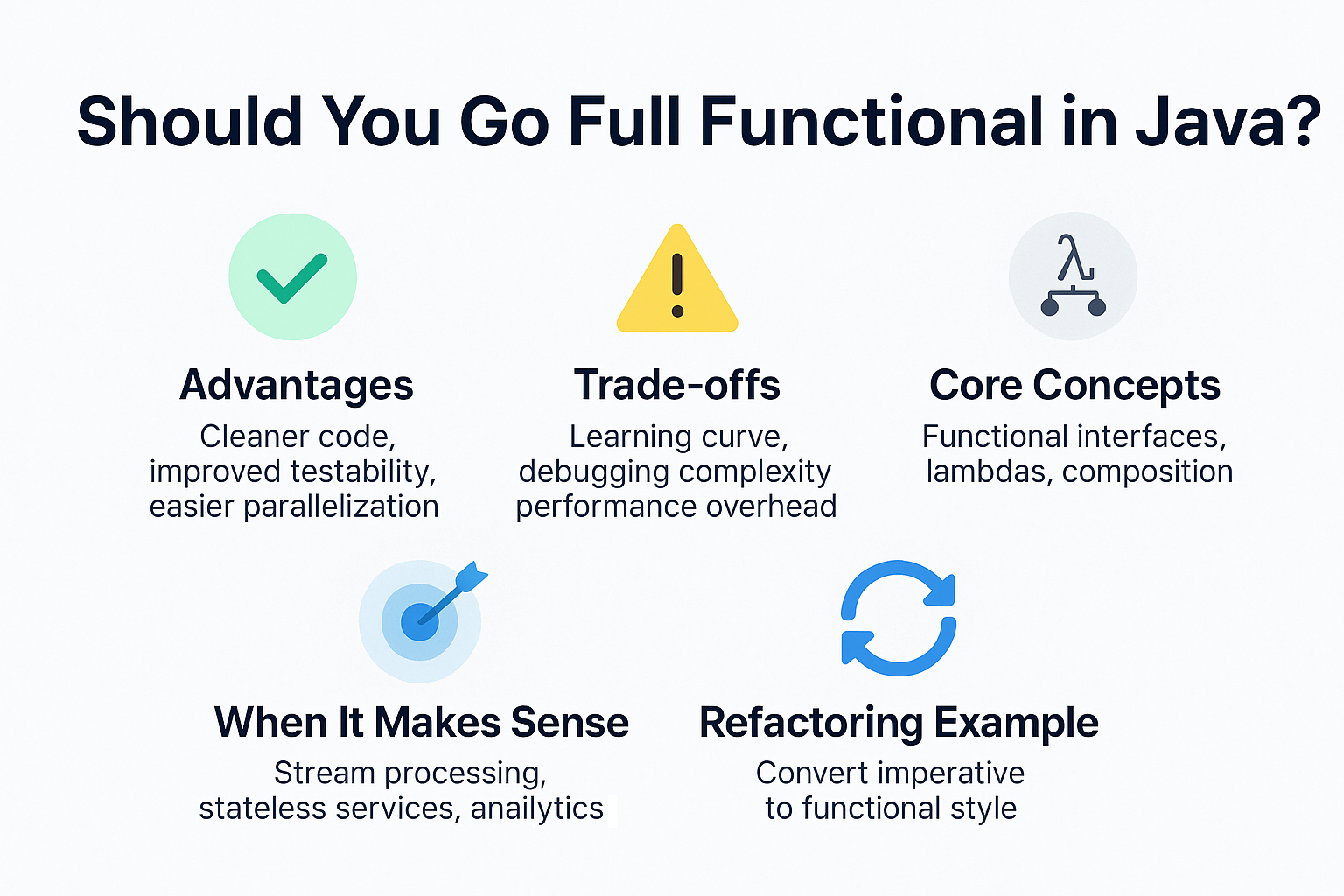Java has embraced functional programming since Java 8, introducing lambdas, the java.util.function package, and powerful stream processing capabilities. But a big question remains: Should you go full functional in Java development?
This tutorial explores what “full functional” means in Java, the benefits and trade-offs of writing code in a functional style, and when it's the right choice for your application.
🚀 Introduction
Functional programming (FP) promotes immutability, stateless computation, and function composition. With features like lambdas, streams, and functional interfaces, Java has gradually evolved to support functional constructs — but it's still an object-oriented language at heart.
Going full functional means emphasizing pure functions, avoiding side effects, composing behaviors using lambdas, and leveraging the functional API where possible — often minimizing classes, mutability, and imperative logic.
But should every project, team, or codebase follow this approach? Let’s break it down.
✅ Advantages of Full Functional Java
1. Cleaner, Declarative Code
Functional style often leads to cleaner and more readable logic, especially with streams:
List<String> filtered = users.stream()
.filter(u -> u.isActive())
.map(User::getName)
.collect(Collectors.toList());
2. Improved Testability
Pure functions are deterministic. They return the same output for the same input and don’t mutate state — making unit testing simpler and mocking unnecessary.
3. Easier Parallelization
With stateless computations, FP integrates well with multi-threading (especially Java 21's virtual threads), reducing bugs from shared mutable state.
4. Higher Abstraction & Reusability
Functions can be composed, chained, or passed as arguments — leading to reusable and composable logic:
Function<String, Integer> parseAndDouble = Integer::parseInt
.andThen(n -> n * 2);
⚠️ Trade-offs and Challenges
1. Learning Curve
Functional style requires a shift in mindset — many developers are more comfortable with imperative, class-based programming.
2. Debugging Streams
Debugging multi-step stream operations is harder than inspecting loops:
items.stream()
.filter(...)
.map(...)
.forEach(System.out::println);
3. Verbosity in Checked Exceptions
Java lambdas don’t support checked exceptions natively, leading to awkward workarounds:
Function<String, String> safeRead = s -> {
try {
return readFile(s);
} catch (IOException e) {
throw new RuntimeException(e);
}
};
4. Performance Overhead
Excessive use of chaining, boxing/unboxing, and object creation in lambdas may impact performance in tight loops or high-frequency tasks.
🔍 Core Functional Concepts in Java
Functional Interfaces
Java’s java.util.function includes:
Function<T, R>Predicate<T>Consumer<T>Supplier<T>UnaryOperator<T>,BinaryOperator<T>
Lambdas and Method References
- Lambdas:
(x) -> x + 1 - Method references:
String::toUpperCase
Composition with andThen() and compose()
Function<String, String> trim = String::trim;
Function<String, String> shout = s -> s.toUpperCase() + "!";
Function<String, String> finalFn = trim.andThen(shout);
📌 What's New in Java 21?
- Virtual Threads – Write non-blocking code in a synchronous style.
- Structured Concurrency – Manage lifecycles of concurrent tasks like a hierarchy.
- Scoped Values – Thread-local-like variables safe for virtual threads.
- Improved lambda inference – Better type inference and support for record patterns.
Previous Highlights:
- Java 8: Lambdas, Streams, CompletableFuture,
java.util.function - Java 9: Flow API, Optional improvements
- Java 11+:
varin lambdas - Java 17: Records for immutable data classes
🧠 Should You Go Fully Functional?
✔️ When It Makes Sense
- Stream-heavy data pipelines
- Stateless services (like REST APIs)
- Real-time analytics
- Event processing
❌ When to Avoid
- Highly stateful applications (e.g., games, UIs)
- Codebases with many side-effects or shared mutable state
- Teams unfamiliar with FP concepts
🧪 Practical Integration with Frameworks
Spring
Spring’s functional bean registration, route configuration, and reactive programming model (WebFlux) all embrace lambdas:
@Bean
RouterFunction<ServerResponse> route() {
return RouterFunctions.route(GET("/hello"), req -> ServerResponse.ok().bodyValue("Hi!"));
}
JavaFX / UI
Functional style can simplify event handlers:
button.setOnAction(e -> System.out.println("Clicked!"));
🔁 Refactoring Example
Before (Imperative)
List<String> names = new ArrayList<>();
for (User u : users) {
if (u.isActive()) {
names.add(u.getName());
}
}
After (Functional)
List<String> names = users.stream()
.filter(User::isActive)
.map(User::getName)
.collect(Collectors.toList());
🧱 Patterns and Anti-patterns
✅ Good Patterns
- Use
Optionalinstead of null checks - Combine
Predicates for filtering - Modularize functions for composition
🚫 Anti-patterns
- Over-chaining streams for trivial tasks
- Ignoring performance overhead
- Using lambdas where simple loops are clearer
🧠 Conclusion and Key Takeaways
- Functional programming in Java is powerful, especially post-Java 8.
- Not every use case benefits from a pure functional approach.
- Use lambdas, records, streams, and method references when it enhances readability and maintainability.
- Avoid dogmatism: blend functional and OO paradigms for the best outcome.
❓ FAQ: Expert Questions Answered
-
Can I use lambdas for exception handling?
Yes, but you must wrap checked exceptions manually or use helper methods. -
What’s the difference between Consumer and Function?
Consumer<T>accepts input and returns nothing.Function<T,R>returns a value. -
When should I use method references over lambdas?
Prefer method references when they improve readability without reducing clarity. -
Are lambdas garbage collected like normal objects?
Yes. Lambdas are objects and follow standard GC rules. -
How does
effectively finalaffect lambda behavior?
Lambdas capture variables by value — only effectively final variables can be used inside. -
Is functional code more performant?
Not always. For large-scale operations, performance depends on JVM optimizations and structure. -
Can lambdas reduce boilerplate in Spring?
Absolutely. Lambdas are widely used in functional route handlers and event callbacks. -
Are lambdas thread-safe?
Lambdas themselves are stateless and safe, but shared mutable state inside them can cause race conditions. -
Should I use lambdas in logging or async operations?
Yes, especially with deferred execution patterns likeSupplier<String>for lazy logging. -
Is full functional style future-proof in Java?
It’s growing, but Java will remain hybrid. Functional features will expand alongside OO support.
